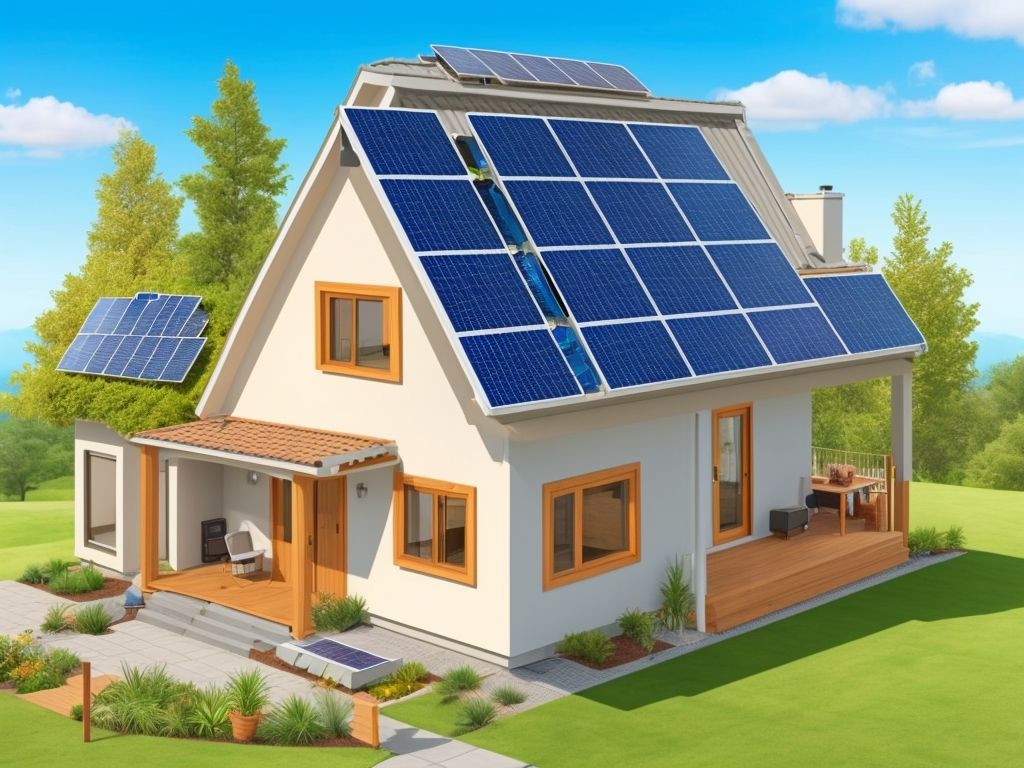Home solar panels are an amazing and sustainable way to generate electricity for your home. They capture the sun’s power, converting it to usable energy, reducing your carbon footprint and cutting your utility bills. Plus, technology advancements have made solar panels increasingly efficient and more affordable.
Installing home solar panels is a great, eco-friendly choice. Photovoltaic cells convert sunlight into direct current (DC) electricity. An inverter changes this DC electricity to alternating current (AC). You can store extra energy generated in batteries or you may get credits or payments from your utility company.
One great feature of home solar panels is their durability. Most manufacturers offer warranties of 20 to 25 years. Plus, they need minimal maintenance – mostly just cleaning.
For better performance, here’s what to do:
- Position the panels for maximum sun exposure. You may need to adjust them as the sun moves.
- Inspect the panels and remove any dust, leaves, or other debris.
- Invest in a monitoring system to track how much energy your panels are generating and consuming.
By following these tips and understanding home solar panels, you can get sustainable energy and reduce your reliance on traditional power sources. It’s an investment in the future. So why wait? Make the switch to solar energy and make a positive impact today.
Benefits of using solar panels
John’s inspiring story proves that solar panels bring real-world benefits! He decided to switch to solar power, concerned about rising electricity costs and wanting to reduce his carbon footprint. Installing solar panels provided John with immediate cost savings, and he experienced the satisfaction of knowing he was being sustainable.
Using solar panels has many advantages:
- Cost savings – Reduced reliance on traditional electricity sources, leading to lower energy bills.
- Environmental impact – By using solar power, you help create a cleaner environment by reducing greenhouse gas emissions and dependence on fossil fuels.
- Energy independence – Generate your own electricity, become less reliant on utility companies and potentially even sell excess energy back to the grid.
- Maintenance ease – Minimal maintenance once installed, as solar panels are designed to withstand various weather conditions.
It’s clear that solar panels provide financial and environmental benefits – a great step towards building a greener future!
Components of a home solar panel system
Solar panels are the main part of a home solar system. They are made of photovoltaic cells that capture sunlight and turn it into direct current (DC) electricity. The solar panels are usually placed on the roof or somewhere with lots of sun throughout the day.
Inverters are then used to convert the DC electricity from the solar panels into alternating current (AC) electricity that is compatible with household appliances.
Batteries store excess energy generated by the solar panels for use when there is low sunlight or high energy demand. Charge controllers make sure the batteries don’t overcharge and control the flow of electricity between the solar panels and the batteries.
Electrical wiring connects all the components, allowing electricity from the solar panels to be sent to the rest of the house.
In 1839, Alexandre Edmond Becquerel discovered the photovoltaic effect. This was the start of practical applications of this technology which lead to modern-day residential solar panel systems.
How do home solar panels work?
Harness the power of the sun with home solar panels! PV cells in these panels convert sunlight into DC electricity. This clean energy powers homes and reduces reliance on traditional energy sources.
Sunlight hitting the panels excites electrons, creating an electric flow. An inverter converts the DC into AC, compatible with household appliances. The excess energy from peak hours can be stored or sent back to the grid.
Net metering policy credits homeowners for excess electricity they produce. This encourages solar energy system investments and sustainable practices.
Optimize solar panel performance with proper installation and regular maintenance. Cleaning removes dust and dirt, plus factors like orientation and shading help determine ideal placement.
Homeowners maximize energy production and savings with optimal solar use. This benefits individuals and contributes to a cleaner future!
Steps for installing home solar panels
Installing home solar panels? Complex process, but worth it to tap into renewable energy. Here’s a guide to help you through it:
- Check your home is suitable. Consider orientation, shading & structural integrity.
- Get a pro to assess your energy needs & design a customized system.
- Get permits & approvals from local authorities & homeowner associations.
- Install the mounting system, to keep the panels secure.
- Connect the panels to an inverter – DC to AC.
- Connect the inverter to your main electrical panel – start tapping solar power!
Remember, installing home solar requires precise knowledge & expertise – get help from experienced pros!
Also, maintain your solar panels for optimal performance. Inspect & clean regularly for max efficiency & longevity.
Fun fact: US residential solar installations doubled from 2019-2020 – 4+ gigawatts of capacity!
Maintenance and care of home solar panels
Keeping solar panels in peak condition is necessary. Here are a few things to note:
- Cleaning regularly: Wipe off any debris, dust or bird droppings with a soft cloth or brush. This boosts sunlight absorption.
- Check for damage: Look for any cracks or defects in the panels. Get help from a professional technician if needed.
- Track performance: Monitor the solar panel’s output using monitoring systems. Identify and address efficiency drops quickly.
- Trim vegetation: Make sure trees or plants near the solar panels don’t overshadow them. Cut branches as appropriate.
- Avoid shading: Place objects like satellite dishes or vents away from the solar panels so they don’t cast shadows.
- Be safe: Follow safety guidelines and turn off power connections when necessary.
For improved longevity and performance, call in reputable companies for full system inspections.
Did you know that proper maintenance can increase a solar panel’s energy production by up to 12%, as per an NREL study?
Conclusion and final thoughts on home solar panels
Time to reflect on home solar panels. They’ve changed how we get energy, paving the way for a more sustainable future. Benefits go beyond just environmental conservation. Homeowners can save on electricity costs, and reduce reliance on traditional sources.
Solar panel technology has made them more efficient. Photovoltaic cells turn sunlight into electricity, through the photoelectric effect. It’s used everyday for practical purposes.
John Turner from Vermont serves as an example. He chose solar panels for his off-grid property. It became economical in the long run and he was self-sufficient. John’s story is an inspiration for anyone looking to tap into solar energy.
Frequently Asked Questions
FAQs: How do home solar panels work?
1. What are home solar panels?
Home solar panels are devices that convert sunlight into electricity. They are typically installed on rooftops and consist of photovoltaic cells made of silicon materials.
2. How do solar panels generate electricity?
Solar panels generate electricity through the photovoltaic effect. When sunlight hits the cells, it excites the electrons, creating a flow of electricity. This direct current (DC) is then converted into alternating current (AC) using an inverter for household use.
3. Do solar panels work on cloudy days?
While solar panels generate the most electricity in direct sunlight, they can still produce power on cloudy days. However, their output may be lower compared to sunny days.
4. Can solar panels power my entire home?
It is possible for solar panels to power an entire home, depending on factors such as the available sunlight, the size of your solar panel system, and your energy consumption. In some cases, you may need to supplement solar power with grid electricity.
5. How long do solar panels last?
Solar panels are designed to be durable and typically come with warranties ranging from 20 to 25 years. However, they can continue to produce electricity beyond their warranty period, albeit at slightly reduced efficiency.
6. Are there any financial benefits to installing solar panels?
Yes, installing solar panels can provide various financial benefits. You may be eligible for government incentives, such as tax credits or rebates. Additionally, by generating your own electricity, you can potentially reduce your monthly energy bills.



